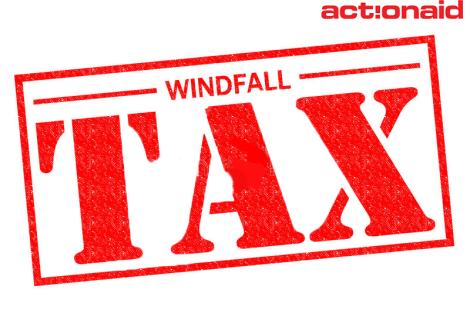Taxing windfall profits of fossil fuels and financial companies can boost climate finance

As millionaires and billionaires fly in to Davos this week to discuss the state of the world, efforts to mitigate and adapt to climate change are desperately underfunded. Long-term solutions to ensure that climate action is properly funded are needed, but in the short-term, climate finance could get a massive boost by applying a windfall tax on windfall profits made in recent years by some of the world’s largest fossil fuels companies and the banks that finance them.
ActionAid and Oxfam have looked at the 200 largest companies in the world by market capitalisation to estimate how big their windfall profits in recent years have been. The research compared profits in the two years up to June 2023 with profits in the four preceding years. Of these 200 companies, 14 were in fossil fuels and 22 in the banking sector, bringing the total to 36 companies in these two sectors.
These companies already made massive profits every year before 2021. To calculate windfall profits, we added another 20% to their already very high profits to allow for natural fluctuations in the economy as well as inflation, and only the profits above the massive normal profits plus 20% have been considered windfall profits, i.e. profits that are abnormal and often due to external factors. In the last two years, the Russian invasion of Ukraine and high inflation and interest rates in much of the world have helped contribute to the bumper profits of fossil fuels companies and the banking sector.
So, when looking at windfall profits, we are not looking at companies that have become more efficient and good at what they do, we are looking at already very profitable companies and sectors that have benefitted from external circumstances. And we are only looking at what an extra tax on these extra bumper profits could achieve.
We found that in the two years running up to June 2023, these 36 companies made windfall profits of US$424 billion. Yes, you read correctly. These are not their overall profits, these are just the profits that are above and beyond their normal profits, even allowing for a 20% increase in profits. By applying a 90% tax on these windfall profits, close to US$382bn could be raised. This money is urgently needed for climate action and to protect vulnerable communities and build resilience through improved social protection and public services. The US$382 billion is almost 20 times as much money as was spent globally on climate adaptation in 2021.
The idea that a windfall tax could be used to fund urgent climate action is not new. In fact, on the first day of COP27 in 2022, Antonio Guterres, Secretary-General of the United Nations,
asked governments to tax the windfall profits of fossil fuel companies and redirect that money to
those most in need and to countries suffering loss and damage due to climate change impacts.
When it comes to climate action, whether it is about measures to reduce our emissions or actions to help people across the world adapt to a changing climate, or to pay reparations to countries and communities for the loss and damage to their land and livelihoods, we are often told that we cannot afford it. We are told that the money simply is not there, and governments are doing what they can with already tight budgets to provide some finance for climate action. Given the long-term economic and human costs of not taking action on climate change, inaction is really bad economics regardless of how you look at it. Inaction causes suffering here and now for countries and communities that are already facing the consequences of climate change.
Long term solutions for sufficient climate finance are needed, and the development of a UN Tax Convention (as agreed in principle at UNGA in November 2023) could make a massive contribution.
But in the short run an obvious and much needed solution is already available to world leaders – a windfall profits tax on the enormous and extraordinary profits that have been made in recent years by the world’s largest companies. Such a tax could be applied across sectors, but should at least be applied to the fossil fuel companies and banking sector that have made bumper profits and contributed to climate change - while most people around the world have suffered the consequences not only of increasing energy prices and inflation, but also of climate change.
So as the world’s leaders and the rich and famous gather in Davos, to discuss complicated matters from the future of AI to military conflicts around the world, surely the easiest thing to build consensus on should be to raise hundreds of billions of dollars in much needed climate finance?